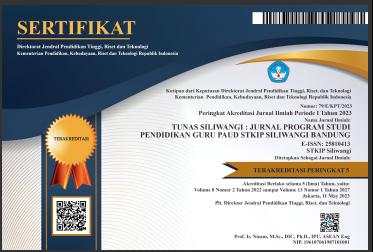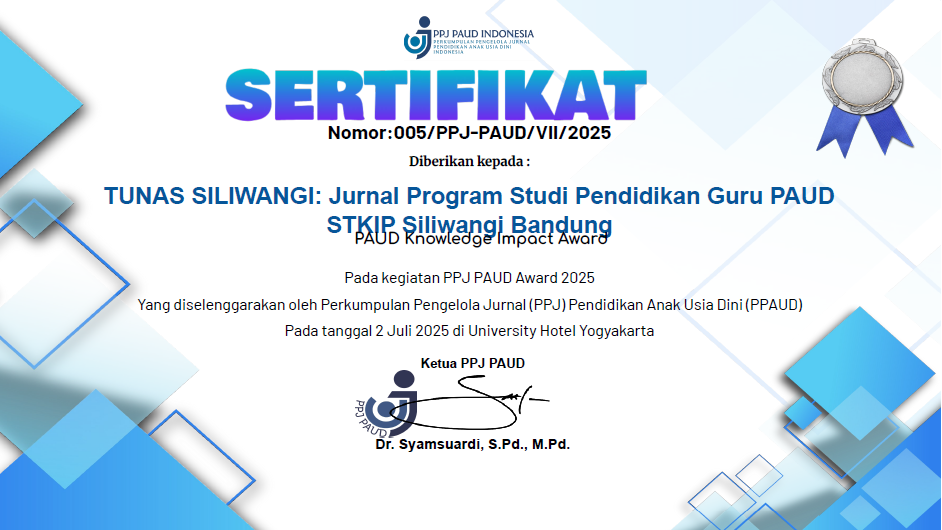The influence of grit on the social and emotional development of children aged 5-6 at the Iwing Family Preschool
DOI:
https://doi.org/10.22460/ts.v11i2.6657Keywords:
Grit, Social EmotionalAbstract
This study aimed to examine the influence of grit on the social-emotional development of children aged 5–6 years at PAUD Iwing Family. A quantitative approach with Pearson correlation analysis was applied to 21 children as participants. Data were collected through structured observations and validated questionnaires. The results showed that 19 children (69.0%) had a high level of grit, 2 children (31.0%) were categorized as moderate, and none were classified as low. The Pearson correlation test revealed a significant positive relationship (p < 0.05) between grit and social-emotional development, indicating that higher grit is associated with better social-emotional outcomes. These findings underscore the importance of grit as a key factor in children’s achievement motivation and emotional well-being. Therefore, fostering resilience and perseverance from an early age should be prioritized in early childhood education.
References
Abnathya, A. (2021). The Impact of Technology on Preschool Children’s Social & Emotional Development. College of Saint Elizabeth.
Aksoy, P., & Gresham, F. M. (2024). Evidence-based social-emotional learning intervention programs for preschool children: An important key to development and learning. International Journal of Psychology and Educational Studies, 11(3), 201–217.
Credé, M., Tynan, M. C., & Harms, P. D. (2017). Much ado about grit: A meta-analytic synthesis of the grit literature. Journal of Personality and Social Psychology, 113(3), 492.
Denham, S. A., Bassett, H. H., Zinsser, K. M., Bradburn, I. S., Bailey, C. S., Shewark, E. A., Ferrier, D. E., Liverette, K. H., Steed, J., & Karalus, S. P. (2020). Computerized social-emotional assessment measures for early childhood settings. Early Childhood Research Quarterly, 51(2), 55–66.
Duckworth, A. L., Peterson, C., Matthews, M. D., & Kelly, D. R. (2007). Grit: Perseverance and passion for long-term goals. Journal of Personality and Social Psychology, 92(6), 1087–1101. https://doi.org/10.1037/0022-3514.92.6.1087
Enjelina, M. (2022). Pola Pengawasan Orang Tua Terhadap Penggunaan Gadget pada Anak Usia 5-6 Tahun di Desa Pauh Ranap Kecamatan Peranap Kabupaten Indragiri Hulu. UNIVERSITAS ISLAM NEGERI SULTAN SYARIF KASIM RIAU.
Jiang, Q., Dill, S., Sylvia, S., Singh, M. K., She, X., Wang, E., Medina, A., & Rozelle, S. (2022). Parenting centers and caregiver mental health: Evidence from a large‐scale randomized controlled trial in China. Child Development, 93(5), 1559–1573. https://doi.org/10.1111/cdev.13782
Li, J., & Li, Y. (2021). The Role of Grit on Students’ Academic Success in Experiential Learning Context. Frontiers in Psychology, 12(1), 1–7. https://doi.org/10.3389/fpsyg.2021.774149
Lickona, T. (2018). How to raise kind kids: And get respect, gratitude, and a happier family in the bargain. London : Penguin.
Maulia, M. (2024). Pengaruh Penggunaan Smartphoneterhadap Perilaku Sosial Emosional Anak Usia 5-6 Tahun Di Desa Tanjung Raya Simeulue. Universitas Bina Bangsa Getsempena.
Nainggolan, T. D. T. (2022). Pengaruh Bermain Puzzle dan Dukungan Sosial Guru terhadap Resiliensi Anak Usia 5-6 Tahun di PAUD Kenanga Raya Medan. Universitas Medan Area.
Oktavia, A. (2024). Pengaruh Regulasi Diri dan Grit terhadap Kecemasan saat Menyusun Skripsi pada Mahasiswa Tingkat Akhir. UNUSIA.
Papalia, D. E., & Martorell, G. (2021). Desenvolvimento Humano-14. Brasil :McGraw Hill.
Ribner, A. D., Ahmed, S. F., Miller-Cotto, D., & Ellis, A. (2023). The role of executive function in shaping the longitudinal stability of math achievement during early elementary grades. Early Childhood Research Quarterly, 64(4), 84–93. https://doi.org/10.1016/j.ecresq.2023.02.004
Santrock, J. W. (2020). A Topical approach to life-span development. Brasil :McGraw Hill.
Schneider, M. (2022). First Steps in Social Emotional Learning Technology: A Digital Diagnostic Assessment’s Impact on Educator Social Emotional Learning Development. The Chicago School of Professional Psychology.
Ștefan, C. A., Dănilă, I., & Cristescu, D. (2022). Classroom-wide school interventions for preschoolers’ social-emotional learning: A systematic review of evidence-based programs. Educational Psychology Review, 34(4), 2971–3010.
Sudrajat, T. (2022). Hukum Birokrasi Pemerintah: Kewenangan dan Jabatan. Sinar Grafika.
Sugiyono. (2018). Metode penelitian kualitatif. Metode Penelitian.
Whitaker, R. C., Dearth-Wesley, T., & Herman, A. N. (2021). The association of daily spiritual experiences with depression among Head Start staff. Early Childhood Research Quarterly, 56(1), 65–77. https://doi.org/10.1016/j.ecresq.2021.03.001
Downloads
Published
Issue
Section
License
Copyright (c) 2025 Dede Setiawan, Arie Widiyastuti, Childa Kumala Azzahri

This work is licensed under a Creative Commons Attribution-ShareAlike 4.0 International License.
The author is responsible for acquiring the permission(s) to reproduce any copyrighted figures, tables, data, or text that are being used in the submitted paper. Authors should note that text quotations of more than 250 words from a published or copyrighted work will require grant of permission from the original publisher to reprint. The written permission letter(s) must be submitted together with the manuscript.







